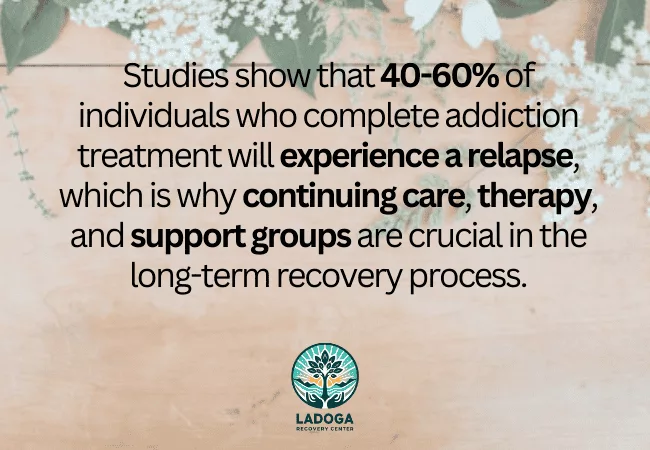Successfully completing a rehab program is a major accomplishment, but it’s only the beginning of a long-term commitment to recovery. Whether you’ve gone through detox treatment, residential treatment, or inpatient treatment, the transition to life after rehab can be both exciting and overwhelming. Adjusting to life after rehab involves not only maintaining your sobriety but also integrating healthy habits into your daily routine that support your overall well-being.
At Ladoga Recovery Center, we understand that this transition can feel daunting, which is why we are committed to providing ongoing support throughout the recovery journey. In this blog, we’ll guide you through some of the key strategies and considerations for adjusting to life after rehab, with a focus on maintaining your progress, staying sober, and building a future free from addiction.
The Post-Rehabilitation Transition: What to Expect
Leaving the structured environment of rehab can feel like stepping into the unknown. In rehab, everything is set up to keep you focused on your recovery, with daily schedules, support from therapists and peers, and constant accountability. Outside of rehab, life can be unpredictable, and you may encounter situations that challenge your sobriety.
However, it’s important to remember that the tools and skills you’ve developed during substance abuse treatment are designed to guide you through this new chapter. The goal is not only to prevent relapse but to create a life that is fulfilling, healthy, and sustainable. Here’s a closer look at how you can stay on track:
Key Factors for Success After Rehab
1. Maintain a Structured Routine
One of the key pillars of recovery is maintaining a structured routine. During rehab, you were likely given a daily schedule that included therapy, activities, meals, and rest. This structure helps you stay focused and avoid the temptations that can lead to relapse. When you transition back into everyday life, it’s essential to create a similar routine that works for you.
For example, set consistent times for waking up, eating, working, exercising, and participating in therapy sessions or support groups. Structure reduces uncertainty and minimizes the chance of returning to old habits. The skills you learned during alcohol addiction treatment, heroin addiction treatment, or cocaine addiction treatment will continue to be helpful in maintaining this structure.
2. Develop Healthy Coping Mechanisms
In rehab, you learned effective coping skills for managing stress, cravings, and triggers. These skills should become part of your new life, especially in moments of vulnerability. Whether you use mindfulness techniques, breathing exercises, or journaling, having a variety of coping mechanisms available will empower you to handle difficult emotions and situations without turning to substances.
If you haven’t yet, it’s also a good idea to engage in healthy activities like regular exercise, healthy eating, and hobbies that bring you joy. These activities can help keep your mind and body occupied and reinforce the positive changes you’ve made.
3. Ongoing Therapy and Aftercare
Recovery doesn’t end when you leave rehab. Aftercare is an essential part of the process and can include therapy, continued outpatient treatment, support groups, or sober living houses. Continuing therapy, such as cognitive-behavioral therapy (CBT) or dialectical behavior therapy (DBT), will help reinforce your progress, help you work through unresolved issues, and give you the tools to navigate challenges that arise.
Staying connected to an addiction treatment center, like Ladoga Recovery Center, even after rehab, is an important part of long-term recovery. Ongoing support can include addiction therapy programs, group therapy, and individual therapy, all of which are critical for preventing relapse and sustaining sobriety.
The Importance of Continuing Therapy After Rehab
After completing a detox or rehab program, it’s crucial to continue therapy to reinforce the progress made and address any underlying issues that may have contributed to addiction. Continuing therapy after rehab ensures that you are equipped with the necessary tools to handle life’s challenges and stay on the path to recovery.
Therapy, in various forms such as individual counseling, cognitive-behavioral therapy (CBT), and group therapy, helps individuals explore the root causes of their addiction, improve their emotional regulation, and develop healthier coping strategies. These therapeutic sessions offer support during moments of self-doubt and provide opportunities to work through difficult emotions like anger, anxiety, or grief. Maintaining this support after rehab can significantly reduce the risk of relapse by helping individuals recognize triggers, understand their behavior patterns, and develop stronger emotional resilience.
Moreover, therapy after rehab gives people the chance to work through family dynamics, trauma, or mental health conditions that may be contributing factors to their addiction. Regular therapeutic engagement is an ongoing process of personal growth, self-discovery, and healing, ensuring that individuals don’t just recover from addiction but also build a strong foundation for a healthy, fulfilling life moving forward.
Strategies for Overcoming Challenges Post-Rehab
1. Recognizing and Avoiding Triggers
Life after rehab can bring about unexpected triggers that might tempt you to relapse. Triggers can range from emotional stress to specific people or places that remind you of your past substance use. Understanding your triggers and developing strategies to manage them is vital.
During your time in residential treatment or inpatient treatment, you learned to identify triggers and practice techniques to manage them. One helpful method is to remove yourself from situations that cause stress or cravings, and to lean on your support network for assistance.
2. Building a Strong Support System
Recovery is not a solitary journey. You need a support system in place—family, friends, or peers in recovery—to help you maintain your sobriety. Connecting with others who understand your experience can provide a sense of belonging and accountability. Attending 12-step meetings, therapy groups, or online recovery groups can help you stay grounded and avoid isolation, which can increase the risk of relapse.
In addition to peer support, having a family support system is crucial. In alcohol addiction treatment or heroin addiction treatment, you may have worked on family dynamics. Now, maintaining open communication with your loved ones can ensure that they continue to be there for you during this transition.
3. Pursuing Long-Term Goals and Personal Growth
Recovery is also about growth. Rehab helped you address your substance use, but it’s important to also focus on your long-term personal goals, such as career, education, and relationships. Having something to work toward can keep you motivated and reinforce the idea that life after rehab is full of possibilities.
Consider setting short-term and long-term goals for your personal and professional life. Celebrate small victories along the way, and don’t be afraid to ask for help when things get tough. This journey is about finding balance, healing, and building a meaningful life free from addiction.

The Role of Support Groups and Peer Relationships
Support groups are an invaluable part of recovery for many individuals. These groups offer a safe and understanding environment where people can share their experiences, struggles, and victories in their recovery journey. Peer relationships formed in support groups help to provide a sense of community, reduce feelings of isolation, and foster accountability.
Support groups such as Alcoholics Anonymous (AA), Narcotics Anonymous (NA), or SMART Recovery create a space for individuals to connect with others who understand the challenges of addiction. Sharing personal stories with others who have walked a similar path can be incredibly powerful and affirming. These relationships offer a source of motivation, encouragement, and hope, reminding individuals that they are not alone in their journey.
In addition to emotional support, peer relationships are important in helping individuals stay accountable in their recovery process. Being part of a support network gives individuals a sense of responsibility toward others in the group. This shared commitment to staying sober can help individuals maintain their resolve and avoid risky situations that could lead to relapse. Support groups also provide opportunities to learn from others’ experiences, which can be instrumental in adopting new coping strategies and maintaining long-term sobriety.
Balancing Personal and Professional Life in Recovery
Adjusting to life after rehab involves finding a healthy balance between personal responsibilities and professional obligations. As individuals re-enter their personal and work life, it’s important to recognize that maintaining sobriety while managing stress, relationships, and work pressures is a delicate balancing act. Striking this balance is essential to long-term success in recovery.
One key to balancing personal and professional life is learning to set boundaries. In both personal and professional contexts, individuals in recovery may feel overwhelmed by expectations and demands. Establishing clear boundaries allows people to prioritize their well-being and sobriety, ensuring they don’t overextend themselves or fall into old patterns of stress that could trigger cravings.
Work-life balance is also essential. It’s crucial to manage time effectively, allowing space for recovery-related activities like therapy, support group meetings, and self-care practices. Avoiding work environments or situations that may trigger temptation or stress is another way to protect your recovery. Having a supportive work environment and open communication with employers or colleagues about your recovery journey can also help to create a space where you feel comfortable and supported.
On the personal front, building a support system is vital. Having people in your life who understand your recovery journey and respect your boundaries can help reduce stress and strengthen relationships. Engaging in healthy activities outside of work, such as exercising, pursuing hobbies, or spending quality time with family and friends, also helps to maintain balance and avoid burnout.
The Role of Detox and Continued Support in Maintaining Sobriety
While you’ve likely completed detox treatment as part of your rehab process, it’s important to continue monitoring your physical and emotional health after rehab. Some individuals may face lingering withdrawal symptoms or cravings that can hinder progress. In these cases, returning for follow-up detox treatment or additional support may be necessary.
Addiction doesn’t just affect the mind; it also impacts the body. Detoxification can help clear lingering substances from the system and restore balance, enabling you to engage more fully in recovery. At Ladoga Recovery Center, we offer specialized prescription drug addiction treatment, methamphetamine addiction treatment, and polysubstance addiction treatment, ensuring that all aspects of your recovery are addressed.
Conclusion
Adjusting to life after rehab can be challenging, but with the right mindset, support, and continued care, it is entirely possible to build a life that is both fulfilling and free from addiction. By maintaining a structured routine, developing healthy coping mechanisms, and staying connected with a support network, you can continue making strides in your recovery.
At Ladoga Recovery Center, we are committed to supporting individuals at every stage of their recovery journey, from detox treatment to long-term aftercare. Whether you’ve completed residential treatment or are seeking additional support after inpatient treatment, our team is here to help you navigate life after rehab. Take the first step towards healing by reaching out today at (866) 609-8454.Your path to a healthier, drug-free life begins here.
FAQ on Adjusting to Life After Rehab
Why is continuing therapy important after rehab?
Continuing therapy after rehab helps to reinforce the progress made during treatment, address any underlying emotional or psychological issues, and provide the support needed to avoid relapse. Therapy helps individuals develop healthier coping strategies and manage challenges that may arise in everyday life.
How can support groups aid in long-term recovery?
Support groups, such as AA or NA, provide a sense of community, accountability, and emotional support from peers who understand the challenges of addiction. These groups help individuals feel less isolated, share experiences, and build long-lasting relationships that encourage ongoing sobriety.
How can I balance my personal and professional life while in recovery?
Balancing personal and professional life in recovery involves setting healthy boundaries, managing stress, and prioritizing self-care. It’s important to create a structured routine that allows time for recovery-related activities like therapy and support meetings, while also fulfilling personal and work responsibilities.
What role does family play in recovery?
Family plays a crucial role in recovery by providing emotional support, encouragement, and understanding. Family therapy and open communication can help rebuild trust, strengthen relationships, and create a stable foundation for long-term sobriety.

